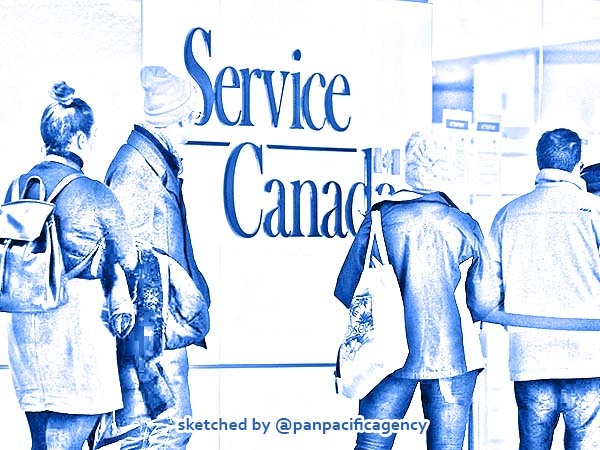[Analytics] Canadians sick with worry: Financial impact of coronovirus

People line up at a Service Canada office in Montreal in a file photo from March 19, 2020. Paul Chiasson/The Canadian Press. Sketched by the Pan Pacific Agency.
Canada is going through a singular period, the greatest crisis in the lifetime of the very oldest of us. A pandemic illness, the virulence of which we still do not have a proper measure, has jolted the entire nation. It has had an impact, literally, on every single Canadian. Rex Murphy specially for the National Post.
The emergency measures that, by degrees, have been put in place — and the ones which yet may have to follow — have brought the country to something very close to a standstill.
Canadians have in the main responded with commendable understanding and acceptance to the recommendations of our health authorities, and to the advice and suggestions from all leaders, premiers and the prime minister. Saying so does not mean they have abandoned their own critical judgment, which is a very good thing. Canadians are ready to criticize when necessary, and react with spirit — as we saw with the attempt at political overreach by the minority Liberal government — when they perceive, or hold serious doubts about, any particularly stray course of action or policy.
That said, at the moment, they are above all concerned with the health of their fellow citizens, their families and loved ones, and themselves. That concern towers over all others, which is the obvious and just reason they have conceded to the vast changes in daily life and the normal run of everyday matters — the self-isolation, social-distancing, cancellation of meetings — the virtual shutdown nationwide of normal social contact and exchange.
For all, it is hard, a time of anxiousness. Made even more so because it comes attended, and unavoidably so, by other concerns. Together with the continuous apprehension COVID-19 brings to the minds of everyone, most people have a host of secondary — secondary, but highly significant — worries to cope with.
Highest on the list, and right next to the pandemic, is “employment” in the broadest sense — whether those who work for a living believe they can endure the period of lockdown without their normal wages, even with the interim assistance of the governments’ relief programs. The vital routine of how people have managed their most important financial concerns has been disrupted, and so many must be, even at this stage of the crisis, in continuous worry about seeing it through to the pandemic’s still unknown end.
Will their jobs be there at all when matters revert to something like normal? The “what happens after this?” question is tormenting many a mind, while those same minds bear the anxiety of the health crisis itself.
There is a whole other group, those whose job is actually their business. In the case of tens of thousands, even hundreds of thousands of truly small businesses, this shutdown — and I mean no blasphemy — is their personal Calvary.
Many have struggled for five, 10, 20 even 30 years, working the longest hours, living on a very tight personal budget, to see their business — corner store, franchise operation, hair salon, book shop, taxi service — the list is endless — come to some stability and profit. Others are in the “buildup” stage, having more or less recently launched a coffee shop, a boutique, a small repair outfit, a carpentry business. They have not yet reached the “stability” point and are burdened with debt, overhead, rents. Now they face a crash. In some cases this is the cruel end of their life’s ambition. What worries and grief these good souls must already be bearing.
Even all this is to say nothing of farmers, and foresters, and oil workers, the legion of workers in our various resource industries, who were getting hammered even before COVID-19 spread its cruel hand across the global economy. Even in imagination it is difficult to grasp how they must, in all their great numbers, be feeling.
COVID-19 has had this one massive impact which we can measure. It has paralyzed the economy of the nation, and thereby paralyzed the personal economies of millions of Canadians.
It has imposed an epidemic of economic stress and anxiety on our whole population.
This is the point at which health and the economy relate to each other. The economy must function for our health system to function and be sustained. Personal economic concerns, while obviously not an illness in themselves, will inevitably, if severe enough and widespread, constitute a crisis equal in scale, if not even greater, than that we are now enduring.
I do not know if it is possible, in the middle of a genuine national crisis, to gather the intellectual and financial resources to deal with a future, but imminent, one. The scale of the economic crisis we will be facing must somehow find the serious attention and planning and urgency we are bringing to COVID-19. Even as, in the darkest of ironies, we are still attempting to combat the coronavirus.
It is an inescapable fact, an axiom of implacable logic, that we must deal with the first crisis first. But the economic crisis to come is already boiling beneath us. Lives are already being upended. The stability of normal times is in disruption. And millions go through their days disturbed in spirit and likely their mental health as well.
It must somehow be prepared for, to whatever degree it can be, now.